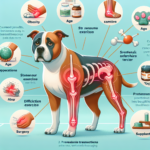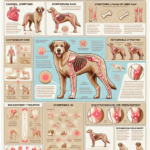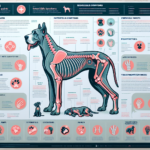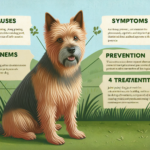Basset Hound Joint Pain: Causes, Symptoms, Prevention, and Treatment
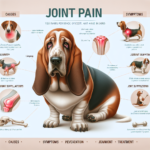
Introduction
The Basset Hound is a breed known for its distinctive appearance and charming personality. Originating from France, these dogs were initially bred for hunting small game, particularly rabbits, due to their exceptional sense of smell and low-to-the-ground build. Characterized by their long ears, droopy eyes, and short legs, Basset Hounds are easily recognizable and beloved by many. Despite their endearing qualities, Basset Hounds are prone to several health issues, with joint pain being a significant concern.
Joint health is crucial for Basset Hounds due to their unique body structure. Their short legs and elongated bodies place additional stress on their joints, making them more susceptible to joint-related issues. Understanding the causes, symptoms, prevention, and treatment of joint pain in Basset Hounds is essential for ensuring their well-being and quality of life.
Breed-Specific Joint Pain Risks
Genetic Predisposition
Basset Hounds have a genetic predisposition to several joint-related issues, including hip dysplasia, elbow dysplasia, and arthritis. Hip dysplasia occurs when the hip joint does not fit properly into the hip socket, leading to pain and mobility issues. Elbow dysplasia involves abnormal development of the elbow joint, causing lameness and discomfort. Arthritis, a common condition in older dogs, results from the inflammation of joints and can significantly impact a Basset Hound’s mobility and quality of life.
Age-Related Risks
As Basset Hounds age, the risk of developing joint pain increases. Typically, signs of joint issues may start to appear around middle age, which for Basset Hounds is around 5-7 years old. However, some dogs may show symptoms earlier or later, depending on their genetic makeup and lifestyle. Regular veterinary check-ups are essential for early detection and management of age-related joint issues.
Activity Level and Joint Stress
Basset Hounds are not as high-energy as some other breeds, but they still require regular exercise to maintain their health. However, their unique body structure means that excessive or inappropriate exercise can place undue stress on their joints. Activities that involve jumping or running on hard surfaces can exacerbate joint issues. It’s important to strike a balance between keeping them active and avoiding activities that could harm their joints.
Common Symptoms of Joint Pain in Basset Hounds
General Symptoms
- Limping or favoring one leg
- Stiffness, especially after rest
- Reluctance to move, jump, or climb stairs
- Decreased activity or playfulness
- Visible discomfort or pain when touched
- Swelling around the joints
Breed-Specific Symptoms
In Basset Hounds, joint pain may manifest in specific ways due to their body structure. Owners may notice their dog having difficulty getting up from a lying position or struggling to navigate stairs. The breed’s characteristic low-to-the-ground build can make these symptoms more pronounced and easier to spot.
When to Consult a Vet
If you observe any of the above symptoms in your Basset Hound, it’s crucial to consult a veterinarian promptly. Early intervention can help manage the condition more effectively and improve your dog’s quality of life. Regular veterinary check-ups are also essential for monitoring joint health and catching any issues early.
Preventive Measures for Joint Health
Exercise Recommendations
Regular, moderate exercise is key to maintaining joint health in Basset Hounds. Activities such as walking on soft surfaces, swimming, and gentle play can help keep their joints flexible and muscles strong without causing excessive stress. Avoid high-impact activities like jumping or running on hard surfaces, as these can exacerbate joint issues.
Dietary Suggestions
A balanced diet rich in essential nutrients is vital for joint health. Consider incorporating foods or supplements that contain glucosamine, chondroitin, and omega-3 fatty acids, which can support joint function and reduce inflammation. Consult your veterinarian for specific dietary recommendations tailored to your Basset Hound’s needs.
Weight Management
Maintaining a healthy weight is crucial for reducing joint stress in Basset Hounds. Excess weight can exacerbate joint issues and lead to additional health problems. Monitor your dog’s weight regularly and adjust their diet and exercise routine as needed to keep them at an optimal weight.
Early Screening and Monitoring
Regular veterinary check-ups and early screening for joint issues can help catch problems before they become severe. Your veterinarian may recommend specific tests or imaging studies to assess your dog’s joint health. Early detection allows for more effective management and treatment of joint issues.
Treatment Options for Joint Pain
Non-Surgical Treatments
Non-surgical treatments for joint pain in Basset Hounds include medications, physical therapy, and lifestyle adjustments. Anti-inflammatory medications and pain relievers can help manage symptoms, while physical therapy can improve mobility and strengthen muscles. Lifestyle adjustments, such as providing a comfortable bed and avoiding high-impact activities, can also alleviate joint pain.
Surgical Options
In severe cases, surgical intervention may be necessary to address joint pain. Common surgical options include hip replacement, joint fusion, and arthroscopy. These procedures can significantly improve a dog’s quality of life, but they come with risks and require a thorough discussion with your veterinarian.
Alternative Therapies
Alternative treatments such as acupuncture, hydrotherapy, and massage can also benefit Basset Hounds with joint pain. Acupuncture can help reduce pain and inflammation, while hydrotherapy provides low-impact exercise that can improve joint function. Massage can help relax muscles and improve circulation, providing relief from joint pain.
Lifestyle and Management Tips
Daily Care Routine
A consistent daily care routine can help manage and alleviate joint pain in Basset Hounds. This routine might include gentle exercise, a balanced diet, and regular administration of any prescribed medications or supplements. Providing a comfortable, supportive bed and ensuring your dog has easy access to food, water, and outdoor areas can also make a significant difference.
Modifying the Home Environment
Making your home more comfortable for a dog with joint pain involves several modifications. Consider using ramps instead of stairs, providing orthopedic beds, and placing non-slip mats on slippery surfaces. These changes can help reduce the strain on your dog’s joints and make it easier for them to move around.
Long-Term Management
Long-term management of joint pain involves regular veterinary check-ups, ongoing monitoring of your dog’s condition, and adjustments to their care routine as needed. Staying proactive and attentive to your dog’s needs can help them remain active and happy despite joint pain.
FAQs About Basset Hounds and Joint Pain
What are the early signs of joint pain in Basset Hounds?
Early signs of joint pain in Basset Hounds include limping, stiffness, reluctance to move, and decreased activity. If you notice any of these symptoms, consult your veterinarian for an evaluation.
Can joint pain in Basset Hounds be prevented?
While it may not be possible to prevent joint pain entirely, you can take steps to reduce the risk. These include maintaining a healthy weight, providing appropriate exercise, and ensuring a balanced diet rich in joint-supporting nutrients.
Are there specific exercises that are better for Basset Hounds with joint pain?
Yes, low-impact exercises such as walking on soft surfaces and swimming are ideal for Basset Hounds with joint pain. These activities help maintain joint flexibility and muscle strength without causing excessive stress.
What dietary supplements can help with joint health in Basset Hounds?
Supplements containing glucosamine, chondroitin, and omega-3 fatty acids can support joint health in Basset Hounds. Consult your veterinarian for specific recommendations based on your dog’s needs.
When should I consider surgery for my Basset Hound’s joint pain?
Surgery should be considered when non-surgical treatments are no longer effective, and your dog’s quality of life is significantly impacted. Discuss the potential benefits and risks with your veterinarian to make an informed decision.
Conclusion
Joint pain is a common issue in Basset Hounds due to their unique body structure and genetic predisposition. Understanding the causes, symptoms, prevention, and treatment options is essential for ensuring their well-being. By taking proactive measures such as maintaining a healthy weight, providing appropriate exercise, and seeking early veterinary intervention, you can help your Basset Hound live a happy and active life despite joint pain. Regular consultations with your veterinarian are crucial for monitoring your dog’s joint health and making necessary adjustments to their care routine.

